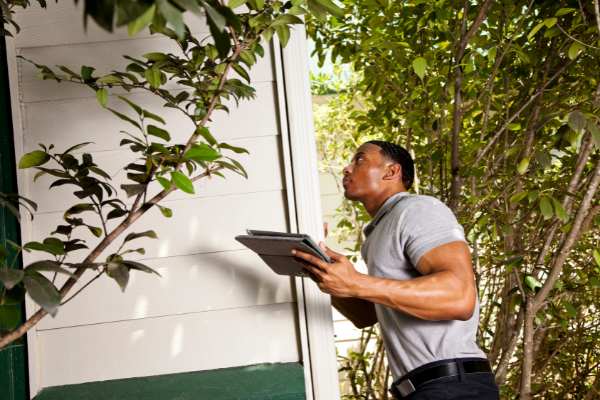Home Buyers: What to Expect from Contract to Close
Yay! You put in an offer on the cutest house and it was accepted, but what now? Below we will walk you through the four phases in the purchase process and help you understand what everything means. Remember that your EXIT Agent is your number one resource for all things home purchase. Reach out to them with any questions or concerns.

Phase 1: Inspection
Once you are under contract on a home one of the first items you will need to take care of is the inspection. Your contract will outline how inspections will be handled. There is generally a 10-day window (although the specific amount of time will be named in the contract) to complete any desired inspection of the property and submit any findings to the seller. It is imperative that once your offer is accepted you contact a certified inspector as soon as possible.
There are a number of different types of inspections you can have on the home if you choose. Keep in mind that these are out-of-pocket costs for you, the buyer, but can give you peace of mind as you go into potentially the largest investment of your life. Below is a list of the different types of inspections you can have completed by a qualified professional.
- Mechanical
- Plumbing
- Electrical
- Structural
- Termite
- Well and Septic
- Environmental and Mold
- Lead
- Radon
Choosing an Inspector
When choosing an inspector keep the following factors in mind and ask the right questions before you hire them. Look for a company that only does inspections so you know that you are getting an unbiased report. Ask what is included in the inspection. If there are additional inspections you want you can ask if they do all of them or if they recommend someone to do the additional inspections. Ask how long the inspection will take, how much it will cost, and when you will receive the results.

Phase 2: Title Search
A title search is one of the important checkpoints on the road to homeownership. Here is what you need to know. When purchasing a home you are legally buying a seller's title to the home. The title is the right to own, possess, use and control the property. Once you are under contract on a property you will need to choose a lawyer or title company to do a title search on the property. This search is to ensure there are no liens or problems with the title. Without a "clean" title you will be unable to take possession of the home.
Title Insurance
You will also want to consider purchasing personal title insurance. Why? Even the most skilled title professionals may not find all problems associated with a property. Some title issues due to filing errors, forgeries, or undisclosed heirs, are difficult to identify. Once you own the property finding out others have a claim to it, or it is associated with some kind of debt can cost you big-time. We, therefore, suggest that you purchase title insurance, a type of indemnity insurance that protects you from financial loss sustained from defects in the title to a property that may be discovered years after you take possession. If you choose title insurance you will pay for this policy at closing and it will protect you for as long as you own your home.
Phase 3: Appraisal
In most cases, your home purchase will require financing of some sort. Once you are under contract and your loan application is complete your lender will order an appraisal of the property.
Your lender will typically hire an appraiser to determine the value of the property and if it is worth what you are paying for it. The fees for the appraiser are usually passed on to you at closing. In order for the loan to be approved the property must appraise for at least the amount that is being financed. The approval is not only to justify the lender's investment but to help keep the buyer from overpaying on a property.
If the property you want to purchase appraises for less than the agreed-upon sale price, the bank will not approve the loan for more than the appraised value. In this case, your deal is void unless you can do one of the following: 1. You can increase the down payment to make up the difference. For example, if you are buying a home for $300,000 and it appraises for $290,000 the buyer can put $10k more in down payment. 2. Another option is to shift some of the down payment to cover the gap. For example, if you were going to put $60,000 down on a $300,000 house (20% down payment) and the appraisal comes in at $290,000 you can shift $10k of the down payment to make up the difference. 3. You can appeal the appraisal if you feel that the appraiser used incorrect information, bad comps, or was unfamiliar with the area. 4. Finally, you can negotiate with the seller to cover the gap.
Once the appraisal is complete the lender will approve your home loan and send you a final commitment lender's letter. This letter will outline the terms of your mortgage agreement including your annual percentage rates, monthly fees, and repayment info for the loan. You will want to review this letter carefully and have any questions answered by your lender before closing.

Phase 4: Closing
The meeting where you will finalize your home buying transaction is called the closing. On the day of closing, you want to bring 2 forms of identification, copies of any documents you’ve signed during the process, and payment for closing costs.
Closing costs are the taxes and fees you pay on top of your mortgage amount. These fees are paid in addition to your down payment at the closing. You can expect to pay between 3 and 5% of the purchase price in closing costs. Common closing costs include:
- Lender Fees- Includes charges for loan processing, underwriting, and preparation.
- Third-Party Fees- Includes charges for insurance, title search, appraisal fees, and other inspections.
- Government Fees- Includes deed recording and state mortgage taxes.
- Escrow & Interest Fees- Includes home owner's insurance, loan interest, real estate taxes, home warranties, and prepaid interest.
- Property Taxes- Capital tax based on the estimated value of the property.
There are 6 steps to a closing:
- You will review and sign your loan documents such as your deed, promissory note, and closing disclosure.
- You provide documentation of homeowner insurance and inspection if required.
- You provide the down payment, closing costs, prepaid interest, taxes, and insurance.
- The lender provides the funds for the cost of your home to the closing agent.
- Depending on the loan you may also need to set up an escrow account for taxes, insurance, etc.
- You receive the keys to your new home.
Congratulations! Once you have completed the closing transaction the home is yours and you can move in. The entire process will likely take 30 to 60 days and may include a good amount of uncertainty as you wait for the final word from the experts. Ultimately, both the selling and buying sides of the transaction want the same result, a smooth exchange in which everyone gets what they need. Rest assured that your EXIT realtor is a professional who has your best interest in mind.






